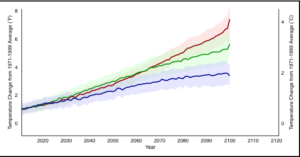
The hockey stick told a simple story: There is something unprecedented about the warming we are experiencing today and, by implication, it has something to do with us and our profligate burning of fossil fuels. Michael Mann, Scientific American
Earth Day 2018 marked the 20 year anniversary of climatologist Michael Mann’s “hockey stick” chart, which detailed the pattern of unprecedented warming in the later part of the 20th century and attributed it to the impact of fossil-fuel-driven development on earth’s atmosphere. The paper concluded that the 20th century, particularly post 1920, was warmer than any other time over a 500 year period.
A professor at Pennsylvania State University, Mann updated his research in 1999 to expand the timeframe of global warming to cover the past 1000 years.
The UN’s Intergovernmental Panel on Climate Change concurred and in its 2001 Third Assessment Report employed the hockey stick to back its assessment that “the increase in temperature in the 20th century is likely to have been the largest of any century during the past 1,000 years.”
In 2013, Mann conjectured that there is currently “at least tentative evidence that the warming is unprecedented over the entire period of the Holocene, the entire period since the last ice age.”
Using proxy-data and collecting records from over 600 sites around the world, PAGES2K Scientists tracked temperature records over a 2000 year timeframe. Their measurements (which included “ tree-rings, ice-layers, layers of sediments and rocks, microfossils, the growth of corals and historic documents”) created a new temperature curve which confirmed the hockey stick graph. (Scientists Compile Most Complete Climate Curve Of The Last 2,000 Years)
[title type=”h4″]The Hockey Stick at 20[/title]
Climate change impacts since 1998 have vastly surpassed estimates: (Mann and NOAA)
[list type=”caret”]
- projections of sea level rise by 2100 have doubled from three feet to over six feet
- the ‘conveyor belt,’ which circulates warm Tropical waters to the northern Atlantic has slowed, threatening the survival of sea life and the moderation of climate in both western Europe and eastern North America
- the six warmest years on record for the planet have all occurred since 2010
- Antartica’s 4.11 million square miles of sea ice is the smallest ever recorded
[/list]
[title type=”h4″]People: The Wildcard in Climate System[/title]

Uncertainty is inherent in any system of climate modeling due to the unpredictability of human impacts on the environment. Population growth, energy consumption and conversion to clean energy, as well as the manner in which mankind reforests are integral yet immeasurable factors.
“While Earth’s average temperature has warmed and cooled throughout our planet’s history, it’s extremely rare for a single life form to drive significant climate change, and never before has a single species had the power to force Earth’s climate to change at the rate climate models project human activities will force our world to warm this century,” writes David Herring.
“Though scientists expect Earth to be perceptibly warmer 100 years from now than it is today, there is still a wide range in how much warming Earth will experience. Our choices will make a big difference.”
